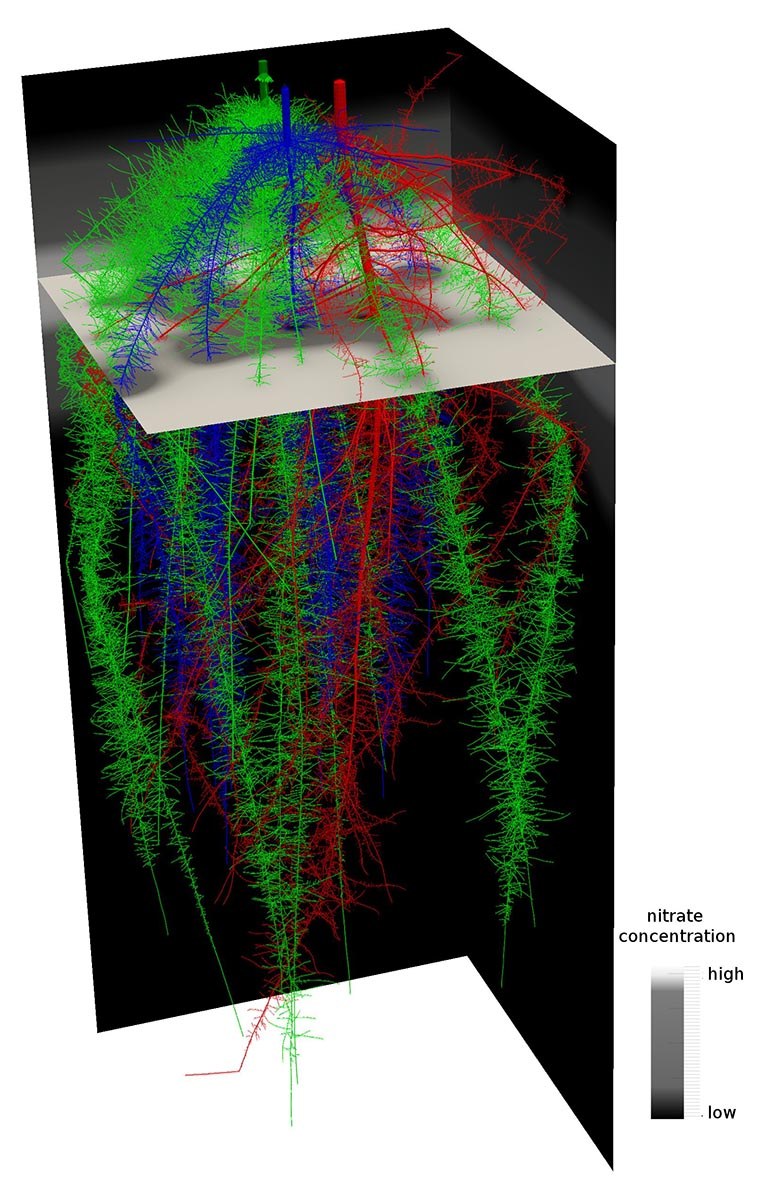This project develops novel modeling tools and deploys them to understand how we can develop more efficient, resilient crops urgently needed in global agriculture.

Root models
The UN Food and Agriculture Organization predict a 60% increase in crop demand by 2050. Current rates of yield increase are insufficient to reach this predicted demand. This realization comes at a time when the approaches of the Green Revolution are reaching their biological limits, while global change and declining availability of irrigation water further threaten production. Given the 20 years between innovation and availability of new technologies to farmers at scale, there is little time to avoid failure in supply. New innovations to reach the forecasted demand are urgently needed. Crops have many quantitatively variable traits, so how do we narrow the billions of possibilities for genetic intervention to find those with the most promise to increase sustainable yield? Crops in silico is a computational framework designed to enable rapid experimentation and discovery to identify the best avenues for genetic improvement. This project builds on the successes achieved from more limited computational predictions that resulted in improvements in yield through targeted, model-directed optimization of photosynthesis and root architecture. Much larger gains are anticipated to come from optimizing the whole plant from genes to crop ecosystem, rather than individual processes or organs.
Corn, soybean, sorghum and wheat account directly or indirectly for over 60% of human calories. These crops are susceptible to declining yields due to impending stress from climate change, including water shortages, elevated CO2, and soil degradation. The proposed research will use integrative multiscale modeling to identify bioengineering and breeding strategies that will improve photosynthetic, nitrogen, and water use efficiency in these crops. This will be accomplished using the Cis_interface computational framework that enables communication between models, even if they are written in different programming languages. A large body of knowledge exists about individual processes that drive plant growth, development and acquisition of resources. However, no attempt has been made to centralize and combine this knowledge into whole plant models that will provide the complete framework for improving crops in a fully informed, quantitative manner. Integrating existing knowledge will result in whole system models that mimic biology. These virtual, mathematical representations of crops will be used to simulate emergent behavior in response to untested environmental conditions, uncover strategies to optimize crop systems, and enable interactive simulations with fast visual feedback and precise 3D geometries. This project is the first to build whole crop models that scale dynamically from molecular to ecosystem levels in a single framework, that is accessible to the whole community. The models will predict ideal forms of the four major crops for different environments and the genetic manipulations needed to achieve these forms in practice.
Researchers on this project
- Dr. Ishan Ajmera - Postdoctoral Researcher
- Ivan Lopez Valdivia - PhD student

